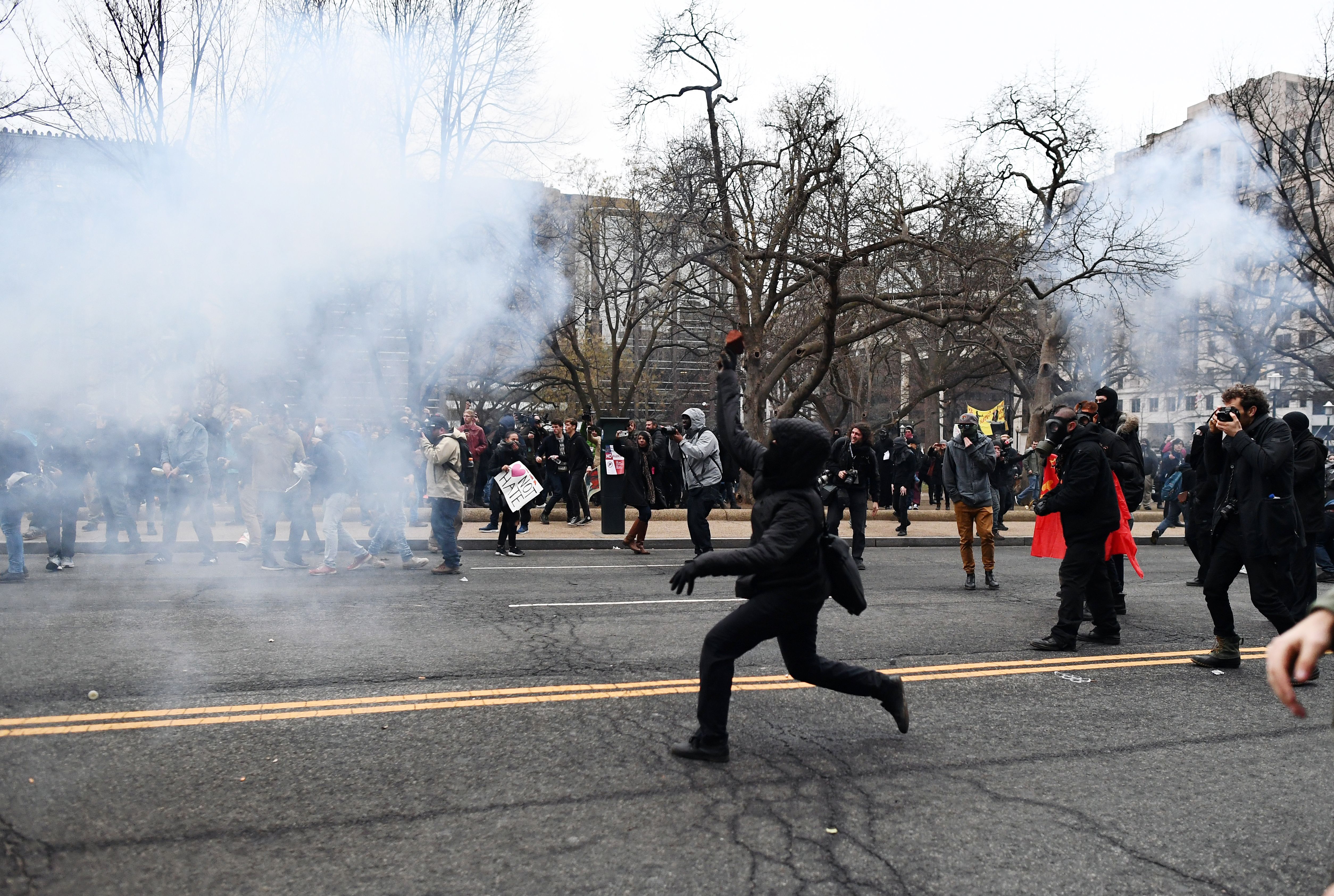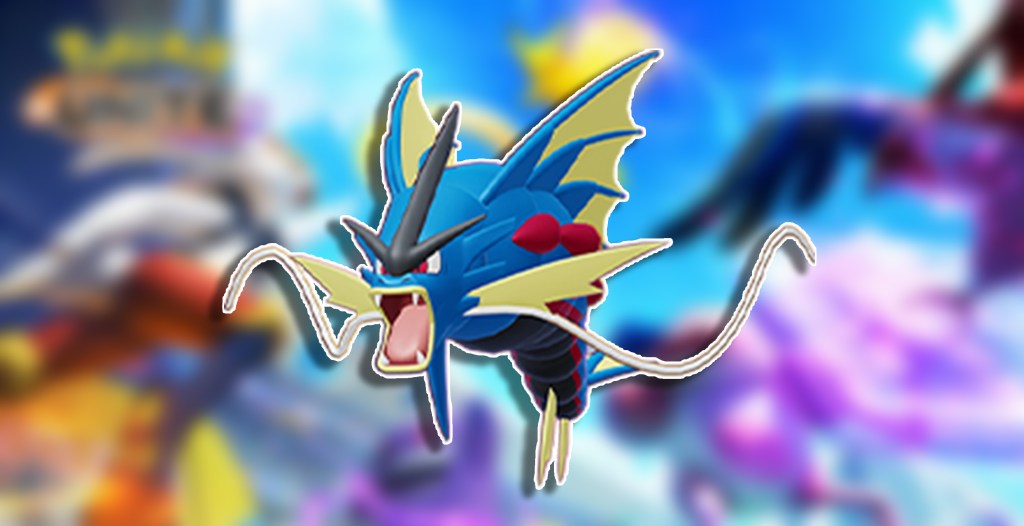The nine anarchists who met me one rainy afternoon in Portland, Oregon, told me they almost showed up to talk to me “bloc’d out”—in the black clothes and masks that have become something of an iconic look.
You likely know what “bloc’d out” means because you’ve seen photos and videos of masked anarchists, or encountered them in person at practically any left-wing protests (or at counter-protests held in response to right-wing rallies). Bandanas, scarves, or helmets are used to guard against the effects of pepper spray and tear gas; they also make it harder for law enforcement to identify them.
Videos by VICE
That’s essential, as the black bloc strategy utilizes militant and often illegal tactics—smashing windows, lighting cars on fire, hurling projectiles at police, and physically challenging the opposition. It was the black bloc who set a limo on fire in DC during Donald Trump’s inauguration, it was the black bloc who punched white supremacist Richard Spencer to great acclaim and controversy, it was the black bloc who rioted in Berkeley to protest the presence of far-right gadfly Milo Yiannopoulos.
Black bloc tactics have been in use since the autonomist movement in 1980s Europe, but they first garnered widespread attention in the US after the chaotic World Trade Organization protests in Seattle in 1999. During those demonstrations, anarchists broke windows, and violent clashes between protesters and police culminated in tear gas being deployed—it got so bad that the mayor declared a curfew on the downtown area.
Although the black bloc strategy has been utilized stateside many times since then, it’s escalated since Trump’s election, and so has the debate over political violence. Demonstrations have turned into brawls between far-right and far-left factions in Seattle and Berkeley; in my hometown of Portland, there have been fights between police and anarchists; in Washington, DC, more than 200 protesters were charged with felonies after the inauguration.
Watch: This armed group is trying to become the new face of left-wing activism
I sought out the anarchists to learn more about what they see as their role in the growing anti-Trump resistance movement, and how they justify their extreme tactics in the face of criticisms from both the left and the right.
The group of nine is multi-racial and comes from varying economic backgrounds and regions of the country, although most claim Pacific Northwestern roots. Most seem to be in the millennial age range, although they tell me the organization has “tons of old heads” working with them. Some came into the anarchist movement after Occupy Wall Street, which one called “protest school.” Others were introduced to anarchism at punk shows, or were seeking out something more extreme than “typical American liberalism,” which they all reject. They all have jobs, but refuse to describe them for fear of being identified—they’ve all been involved in various illegal protest-related activities, and only agreed to speak to me on conditions of anonymity. (All names have been changed.)
They see their brand of anarchism as an evolution of an international movement that has been standing up for the disenfranchised for decades. That mission goes beyond the tactics that have caused so much controversy. The group told me about the classes local anarchists provide in first aid, self-defense, and other topics; the left-wing community outreach group Portland Assembly; and the anarchist effort to fill some of Portland’s many potholes after the government failed to do so. (That last item represents probably the only good bit of mainstream press the anarchists have gotten as of late).
Portland has been dealing with a homeless crisis for years, and during an abnormally bad storm this January, four homeless adults and a newborn baby died. The local government’s approach to the storm was seen by many in Portland as insufficiently urgent, and the anarchists joined with homeless advocates and went out into the streets with blankets, sleeping bags, coffee, and soup for those living without shelter.
Still, when I asked them if it’s fair to say they represent the weaponized wing of the resistance movement (literally weaponized in the case of the black bloc), they said it was—but were quick to point out their motivations extend well beyond opposition to the current president.
“The narrative that this fight is pro-Trump against anti-Trump is wrong. This is about ultra nationalism,” Victor, a mountain of a man who is clearly wary of saying too much, told me. “We have people working in France; we have people like the Zapatistas… We are all fighting in defense of our communities, but we have the capacity, skills and courage to be offensive. We will not bow down to fascists in the street, to a cop in uniform, or to those in the White House.”
Clay, a skinny, intense man whose voice quivers and rises with passion when he speaks, told me anarchist beliefs “are rooted in the desire for a stateless and fascism-free society, and are defending marginalized communities from a long history of white supremacy asserting itself. We want to destroy the status quo and are willing to do so by any means necessary—whether it’s teaching communities to be self-reliant or something extreme like blocing up.”
They all have stories of mistreatment by police. Blair, who sat quietly, librarian-like, for most of our conversation, told me she was once detained in a West Coast city she doesn’t want to name after a confrontation between the black bloc and police. She said she was shown a massive book with files on her and her associates and was told, “We’re watching you and your friends.” (She told me she wasn’t charged with a crime.)
Victor added, “We operate under the assumption that we have already been infiltrated by right-wing groups and undercover cops, and that we’re being illegally monitored by law enforcement just as Black Lives Matter and Occupy were by the NYPD.”
It sounds, frankly, like an exhausting way to live, but to Victor the struggle with Trump supporters and what he sees as a fascist movement taking hold in America is “quite literally a war… for us, resistance is intuitive and something we have to do.”

A protester throws a brick at police during Inauguration Day protests. JEWEL SAMAD/AFP/Getty Images
These anarchists think the mainstream left has never taken the rise of the alt-right and white nationalism seriously enough. They see their destructive acts in the streets as a wake-up call for the left and a warning to the extreme right—as a call to arms and an example of how to fight what they see as fascism.
Victor laughed when I asked about if they’re worried about their more controversial actions turning people off to the movement, telling me that “mainstream liberals cling to institutions like the police and elected officials that time and again have let them down—yet they continue to return to their abuser like a battered spouse.”
“We’re willing to put ourselves on the line for this. ‘By any means necessary’ is something we take very seriously.”
As for the debate over whether political violence can be justified, to them it’s not a debate. “I abhor violence against people for the most part—but these aren’t people, they’re Nazis,” said an anarchist I’ll call Sean, to laughter from the group.
A man who goes by Rip described how it felt to be in the bloc, charging into literal battle. “I feel more logical than emotional,” he said. “There are so many things going on, from the cops, to making sure your people in the bloc are OK, to staying vigilant for a crazy Trumper with a gun… Adrenaline is definitely running high, but the result isn’t so much excitement of exhilaration as it is closely observing and calculating the risks. It’s a strange calmness in the chaos that’s born out of vigilance and trust in your people.”
When I mentioned the bad press black bloc tactics got both the election and recent May Day protests here in Portland (both devolved into violence and destruction and were declared riots by police), Clay snorts and said, “Yeah? Nobody was paying attention to the Portland protests until we made them. Suddenly the whole world’s eyes were on Portland. We’re willing to put ourselves on the line for this. ‘By any means necessary’ is something we take very seriously.”
I asked the group to respond to criticism that its tactics may turn people away from the causes it endorses, and Clay, speaking with such fervor the tables behind us looked over, noted that other political parties in Germany attempted to reason with Adolf Hitler during his rise. “The neoliberals may not know it yet, but the militant anti-fascists are the ones that history will remember as fighting the rise of fascism in this country—not them.”
What about the property damage done by the black bloc? When a business’s window is broken, that’s not violence against a state but violence against that window’s owner, and in Portland odds are good that the owner is anti-Trump.
The group nodded approvingly as Clay drained his beer and coolly told me they feel no pity for “a bougie boutique that has participated in the displacement and ‘death by gentrification’ of neighborhoods that used to be inhabited by families from already marginalized communities.”
Norm Stamper was the Seattle police chief during those famous 1999 WTO protests, which led to his resignation. “It’s a mistake to underestimate the anarchists as unthinking people bent only on destruction, they’re actually usually some of the most organized protesters,” he told me. More than almost anyone else, he understands the difficult position police are in when confronted by violent protests, and the lack of viable options.
Though he has been open about regretting the decision to use tear gas on the protesters, Stamper says that he “was shocked by the inaction the police” in Berkeley in April when anarchists and the alt-right clashed in the street. “If they don’t act, then they have abdicated their responsibility. You’ll be criticized either way, and it doesn’t matter which side is to blame, you must act.”
Stamper added that law enforcement’s use of militarized tactics often only feeds the chaos the anarchist groups seek. “They’ll probably tell you to ‘go pound sand’ when you try to talk to them. They might say something much worse! But you have to try and engage these folks,” is Stamper’s advice to cops dealing with anarchists. “Violence is rarely the answer—and tear gas never is. All you’ve done is prove their point and caused indiscriminate harm to citizens. Move them by force if you must, but don’t make the first move and don’t gas them.”
Stamper is more sympathetic to the anarchists than most police chiefs, and the animosity between the cops and the black bloc cuts both ways. Clay told me that the at recent protests in Vancouver, Washington, anarchist and anti-fascist flagpoles were taken by the cops but the sieg heiling Trump supporters were allowed to keep their firearms.
“As police departments around the country become more and more militarized, and as white nationalist and alt-right groups are further emboldened by the Trump regime, the need for militant tactics is higher than ever,” said Sean. “At these protests, the bloc takes up a lot of law enforcement’s attention, which in turn allows actions to flourish in ways they couldn’t if we weren’t there… I bet some of the people we’ve helped unarrest were glad we were there to interfere.” (Sean defined “unarrest” for me as “interfering with law enforcement’s attempts to detain someone in the block by using force.”)
I asked Portland Police Bureau spokesman Pete Simpson about these criticisms made by the anarchists, and he told me, “It’s easy to paint us as for or against a certain group, but that’s just not the case. The police don’t like working the protests because it’s hours of very tense boredom that can suddenly turn into confused violence—violence these anarchists start.”
What about the militarized police tactics so despised by protesters?
“We are always reviewing our tactics,” Simpson replied. “It’s almost impossible because people want us to solve things… and half feel we don’t do enough at these protests and half feel we go too far. They (the anarchists) force our hand.”
If dealing with the black bloc is complicated for police, it’s even more so for left-leaning activists who abhor the use of violence.
A protest organizer I spoke with under the condition of anonymity echoed a refrain I heard time and again when discussing this article with those on the left: “It’s an incredibly complex situation with those guys because in theory I agree with them almost completely—but I still think the best way to alter a powerful and corrupt system is from the inside and exercising your rights to free speech… and I worry about something like martial law being imposed if something goes really bad.”
“The fascists are organized and collaborating nationally. We have to be as well.”
Those engaged in tactics like the black bloc see these sort of concerns as part of the larger problem of bowing to a corrupt system. “In an atmosphere in which the president and his representatives can outright ignore basic truths and freedoms, more and more people are realizing there is no room for the tepid debates of the past,” said an anarchist I’ll call Lauren.
To understand how this group thinks, it’s important to realize that when they see conflicts like the “Battle of Berkeley,” they regard them as progress.
“The fascists are organized and collaborating nationally. We have to be as well,” Clay said. “They are violent and empowered, and we will continue to meet them with equal aggression. They need to know this. We are ready. We’re not the ones the cops are out there protecting. It’s the fascists on the right getting the police escort.”
The rhetoric isn’t likely to cool down anytime soon. Last weekend, two men were fatally stabbed, and a third was critically wounded while defending two teenaged women, one of whom was wearing a hijab, from a man screaming racist insults at them on Portland’s light rail system. At his court appearance, suspect Jeremy Joseph Christian shouted “You’ve got no safe place!” and “Death to the enemies of America!”
In the wake of that stabbing, Portland mayor Ted Wheeler has asked a right-wing group to call off a rally scheduled for Saturday, but they are unlikely to heed him. The anarchists I spoke with would not comment on that rally, but chances are they’ll be there with masks on.
But for all the anger in the air, few people seem likely to go full black bloc, even if they believe the cause is just. To belong to the group I spoke with, you need to not just oppose the far-right thugs willing to fight in the street, but also the government and the police. That’s a tall order.
Stamper surprised me during our talk when he said he thinks people hitting the streets is the most viable form of protest, and that he understands where the rage comes from. But when I asked what he thought of the black bloc, he replied, “If you think there are nothing but bad apples in the police department, why provoke them? That’s a battle the anarchists will never, ever win.”
Follow Donovan Farley on Twitter.
More
From VICE
-

A24 -

Screenshot: Epic Games -

Mega Gyarados in Pokemon UNITE

